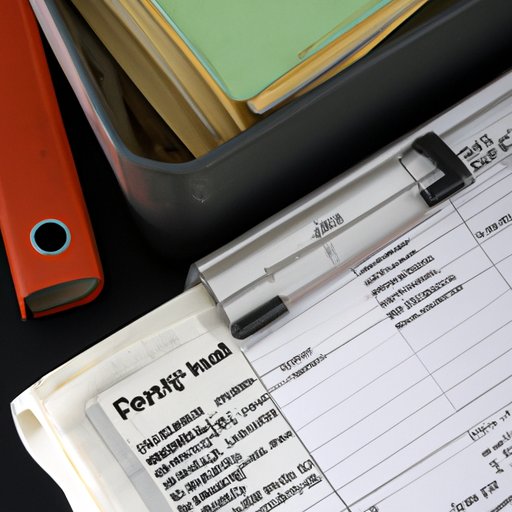Introduction
Financial records are important documents that reflect your financial activities, such as income, expenses, investments, taxes, and more. These documents can provide valuable information about your financial health and can help you make informed financial decisions. It is important to keep these records for a long period of time in case you need to refer to them in the future.

Legal Requirements for Keeping Financial Records
The length of time you need to keep financial records depends on the type of document and the laws in your country or state. Generally speaking, most countries require individuals to keep financial records for at least five to seven years. For example, in the United States, the Internal Revenue Service (IRS) recommends that individuals keep their financial records for at least three years. However, some documents, such as tax returns and supporting documents, must be kept for up to seven years.
It is important to note that different countries and states have different laws regarding the length of time financial records should be kept. For example, in Australia, financial records must be kept for five years, while in Canada, financial records must be kept for six years. Therefore, it is important to check the laws in your country or state before deciding how long to keep your financial records.
Tax Implications of Long-Term Financial Record Keeping
Keeping your financial records for a long period of time can also have a positive impact on your taxes. By keeping records for a long period of time, you can take advantage of tax deductions and credits that may be available. For example, if you are able to show that you have made charitable contributions over a period of several years, you may be eligible for tax deductions. Similarly, if you have invested in certain types of assets and held onto them for a long period of time, you may be eligible for tax credits.
In addition to taking advantage of tax deductions and credits, keeping financial records for a long period of time can also help you avoid potential problems with the IRS. If you are ever audited by the IRS, having accurate and complete financial records will help you prove your case and avoid any penalties.
Assessing the Costs of Storing Financial Records Long-Term
Storing financial records for a long period of time can be expensive. The cost of storing physical documents can add up quickly, especially if you are keeping paper records. In addition, filing and organizing documents can be time consuming. Digital storage solutions can be less expensive, but they may come with additional costs, such as software licenses and subscription fees.
It is important to assess the costs of storing financial records before deciding how long to keep them. While the benefits of long-term financial record keeping may outweigh the costs, it is important to consider all of your options before making a decision.
Analyzing the Different Types of Financial Records and When to Keep Them
The type of financial record you are keeping will also determine how long you should keep it. For example, bank statements should generally be kept for one year, while credit card statements should be kept for two years. Investment records should be kept for at least three years, and tax documents should be kept for at least seven years.
It is also important to note that some types of financial records may need to be kept longer than others. For example, if you are involved in a lawsuit or have received a notice from the IRS, you will need to keep all relevant financial records until the matter is resolved.
Providing Tips on How to Organize and Store Financial Records Long-Term
Organizing and storing financial records can be challenging, especially if you are planning to keep them for a long period of time. One way to make the process easier is to create a filing system that makes it easy to find and access documents when needed. Digital storage solutions can also make it easier to store and organize documents, as well as share them with others.
If you are overwhelmed by the task of organizing and storing financial records, there are professionals who specialize in this area. These professionals can help you create an efficient filing system and ensure that your records are stored securely.
Conclusion
Financial records are important documents that should be kept for a long period of time. Keeping financial records for a long period of time can help you take advantage of tax deductions and credits, as well as avoid potential problems with the IRS. It is important to assess the costs of storing financial records before deciding how long to keep them, and to understand the legal requirements in your country or state. Additionally, organizing and storing financial records can be made easier with digital storage solutions and professional help.
(Note: Is this article not meeting your expectations? Do you have knowledge or insights to share? Unlock new opportunities and expand your reach by joining our authors team. Click Registration to join us and share your expertise with our readers.)
